Learning from COVID-19 to strengthen gender-responsive Disaster Risk Reduction
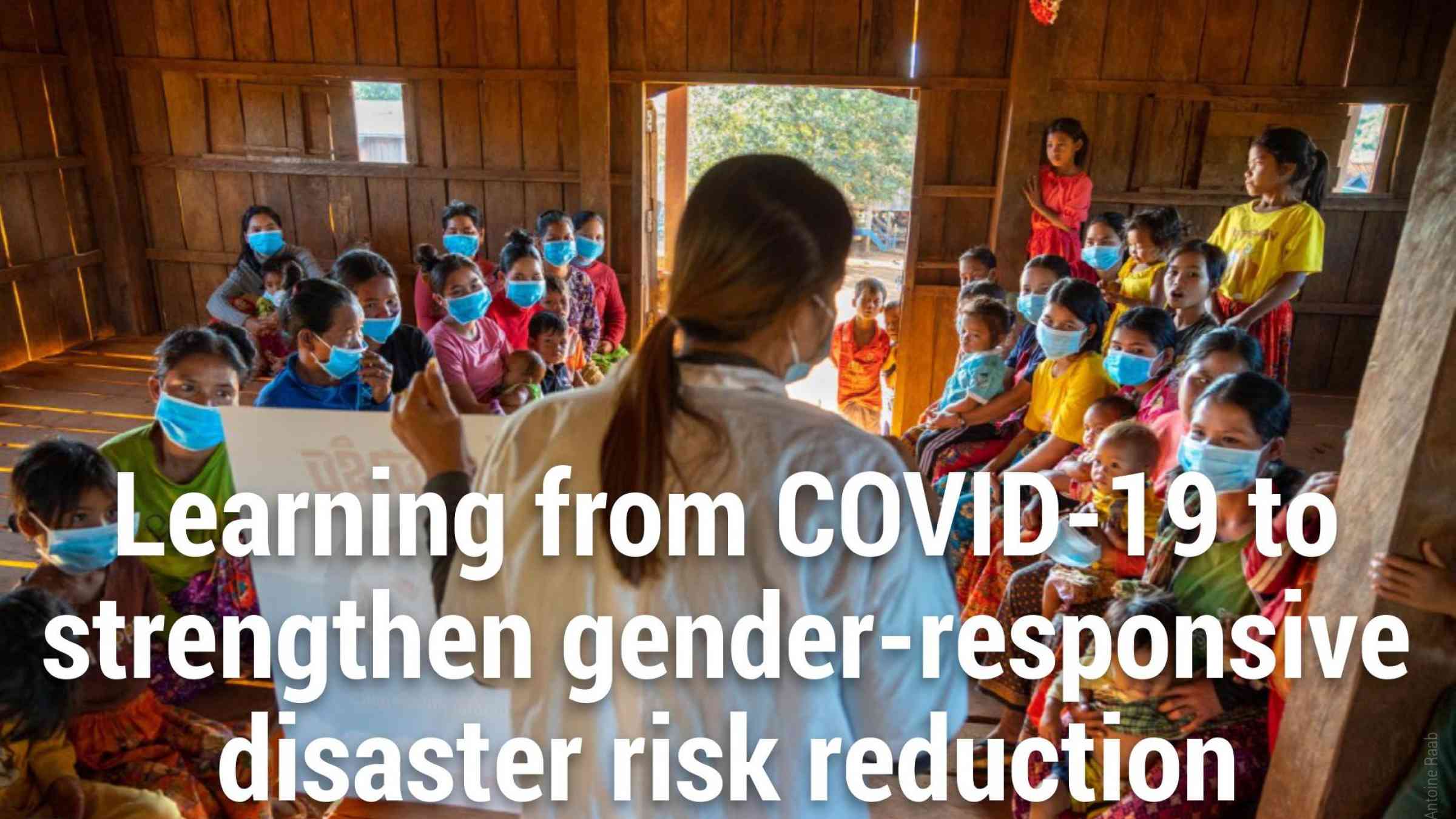
- English
Registration link
Video recording of the meeting
Date and time
23 April 2021, 12:00 - 13:30 CEST
Background note
As the world is grappling with the challenges brought about by the COVID-19 pandemic, many communities are experiencing the impact of compounded disasters, with COVID-19 and natural hazards stretching resources and testing coping capacities. Building resilience requires a multi-hazard, inclusive, all-of-society approach that considers the wide range of challenges a community may face, from climate change to pandemics to natural hazards.
But disasters, whether caused by viruses or natural hazards, are not felt uniformly by everyone in our societies. Gender, income inequality, geography, age, and other socio-economic factors will determine how such events impact people.Disasters exacerbate many of the prevailing gender inequalities that exist in societies. 70 per cent of health workers and first responders are women and they are more likely to be exposed to the virus. At least 11 million girls are at high risk of never returning to school as a result of the COVID-19 pandemic, signaling future generations of girls who have fewer opportunities, are less-educated, and are more likely to marry early and be subjected to intimate partner violence.
The pandemic has resulted in a reallocation of resources and priorities that have adversely impacted on women’s health care and protection. Furthermore, women’s over-representation in sectors severely impacted by COVID-19 restrictions, including tourism, hospitality, and informal work, has resulted in women bearing the brunt of the economic fallout from COVID-19. The social impact for women is high, with limited social safety nets and fiscal stimulus, a higher burden of unpaid care and domestic work, and higher rates of domestic and intimate partner violence.
Understanding how gender relations shape lives is critical to disaster risk reduction. Gender relations can influence how people’s roles, responsibilitiesand access to resources are affected by different hazards. Furthermore, gender intersects with socio-economic characteristics such as age, disability, race, sexual orientation, displacement and migration status, to shape people’s unique vulnerability. To reduce disaster risk we must ensure that all disaster related strategies, policies and plans are informed by an intersectional gender analysis across all sectors for greater gender responsiveness.
In the context of COVID-19, Government recovery plans must be evidence-based, participatory and take an all-of-society approach. Yet a lack of disaggregated data often means plans are not informed by adequate, quality data and as a result the gendered impacts of the pandemic are not fully understood. At the same time, women’s leadership in COVID-19 recovery is lacking, with women making up less than a quarter of national-level committees established to respond to COVID-19.
In order to recover from this crisis and build resilience we need to strengthen women’s leadership at every level - from national crisis committees to local communities. Women’s leadership brings essential knowledge, skills, resources and experience to emergency response and resilience building. To uphold women’s rights and fully leverage the potential of women’s leadership in disaster risk reduction, the perspectives of women and girls in all of their diversity must be integrated in the formulation and implementation of policies and programmes at all stages of prevention, preparedness, response and recovery across all sectors.
While COVID-19 is a global disaster, it also presents an opportunity for change. The crisis gives us an opportunity to build back better and to put women at the centre of the recovery. If we are able to ensure our recovery to COVID-19 strengthens women’s leadership in disaster governance, supports multi-hazard risk assessments, preserves and protects women’s rights and enhances gender equality, we can build on this experience to strengthen resilience for all.
Objectives of the event
The event will:
1. Highlight the need for and effectiveness of gender-responsive disaster risk reduction in COVID-19 recovery.
2. Identify challenges and good practices in developing and implementing gender-responsive disaster risk reduction strategies, policies and plans at the country level.
3. Discuss the specific challenges of compounded disasters and how a gender-transformative approach can help reduce multi-hazard disaster risk.
Speakers' Biographies
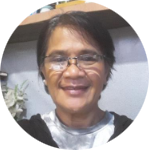 |
Josephine Castillo Grassroots community leader, GROOTS Philippines and Huairou Commission Josephine Castillo is a community organizer for more than 20 years and founding leader of Solidarity of Oppressed Filipino People Inc. (SOFP), a federation of 235 community- based organizations across the Philippines. She has forged partnerships with national ministries, municipalities, and private sector to build collaborative mechanisms that recognize and resource women’s priorities for resilient development. Following Typhoon Haiyan, she created a multi-stakeholder consortium in Tanauan Leyte, to address women’s recovery and construction concerns through creating revolving loan funds, rotating use of construction tools for owner-led housing repair and negotiating for permanent resettlement of displaced families. |
|
 |
Ms. Sari Lehtiranta Minister, Deputy Permanent Representative, Permanent Mission of Finland to the UN, Geneva Prior to her appointment to Geneva in 2018, Ms. Lehtiranta had served as Director of the Unit for Development Policy at the Ministry of Foreign Affairs of Finland since 2014. She was Deputy Director General of the Department from 2014 to 2015. Ms. Lehtiranta has over 20 years of experience within the spheres of bilateral and multilateral affairs and development. |
|
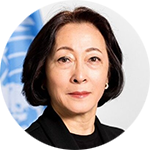 |
Ms. Mami Mizutori Special Representative of the Secretary-General, United Nations Office for Disaster Risk Reduction (UNDRR) On 31 January 2018, the United Nations Secretary-General announced the appointment of Mami Mizutori of Japan as Assistant Secretary-General and Special Representative of the Secretary-General for Disaster Risk Reduction, United Nations Office for Disaster Risk Reduction (UNISDR). Ms. Mizutori brings to the position a combination of management and leadership expertise as well as more than 25 years of experience in international affairs and security. |
|
 |
Ms. Tine Mørch Smith Ambassador and Permanent Representative to the United Nations and Other International Organizations in Geneva, Norway Prior to her appointment to Geneva, Ms. Mørch Smith had been serving as Director General of the Department of Regional Affairs at the Ministry of Foreign Affairs of Norway since 2015. She was Deputy Director General of the Department from 2014 to 2015. She also served at the Section for Human Rights and Democracy at the Ministry from 2005 to 2010, first as Assistant Director General and then Deputy Director General; and at the Section for Humanitarian Affairs from 2000 to 2005 as an adviser. |
|
 |
Ms. Ha Nguyen Research Fellow, Gender, Environment and Development Research Cluster, Asia Centre, Stockholm Environment Institute (SEI) Ha is a researcher and development practitioner. Her current work with Stockholm Environment Institute centres on the intersecting of gender, social justice and empowerment in multiple thematic areas such as agriculture and livelihoods, sustainable resource management, disaster risk reduction and climate change adaptation, energy transition and geospatial technologies. She is also an expert in gender mainstreaming with a strong commitment to issues of justice and empowerment of women and civil society. Ha has a master in gender and development studies specializing in environment. |
|
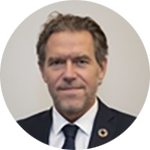 |
Mr. Ib Petersen Deputy Executive Director, United Nations Population Fund (UNFPA) On 24 June 2020, United Nations Secretary-General António Guterres has appointed Ib Petersen of Denmark as Assistant Secretary-General to serve as the Deputy Executive Director, Management of the United Nations Population Fund (UNFPA). Mr. Petersen, who recently served as Director for the Department of Migration, Conflict and Stabilization of the Danish Ministry of Foreign Affairs, brings to the position over 30 years of experience within the spheres of bilateral and multilateral affairs and development. https://www.unfpa.org/sites/default/files/biographies/ASG_Ib_Petersen.pdf |
|
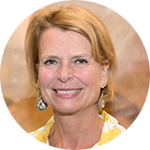 |
Ms. Åsa Regnér Deputy Executive Director for Normative Support, UN System Coordination and Programme Results, United Nations Entity for Gender Equality and Women’s Empowerment (UN Women) Ms. Åsa Regnér is the Assistant Secretary-General and Deputy Executive Director for Normative Support, UN System Coordination and Programme Results since May 2019. Ms. Regnér served since 2014 as Minister for Children, the Elderly and Gender Equality of Sweden, where her focus was on concrete results in the implementation of Swedish gender equality policies as well as a shift towards prevention of violence against women and the involvement of men and boys in gender equality work. She has extensive experience in the area of gender equality and women’s empowerment, having held various leadership positions in government, Non-Governmental Organizations (NGOs) and the United Nations. |
|
 |
Mr. Jeff Roach Deputy Permanent Representative and Deputy Head of Mission at the Australian Permanent Mission to the United Nations in Geneva, Government of Australia Jeff Roach is the Deputy Permanent Representative and Deputy Head of Mission at the Australian Permanent Mission to the United Nations, Geneva. Mr. Roach is a senior career officer with the Department of Foreign Affairs and Trade and served as Australian High Commissioner to Vanuatu (2011-2012). He has been previously posted to Paris and Vientiane. Mr. Roach has led Australian crisis response teams to Kathmandu (2015) and Burkina Faso/Niger (2016), as well as to Cyprus for the evacuation of foreign nationals from Lebanon (2006). Mr. Roach speaks Bislama and French. |
|
 |
Mr. Bård Vegar Solhjell Director General, Norwegian Agency for Development Cooperation, Government of Norway Bård Vegar Solhjell is Director General of the Norwegian Agency for Development Cooperation, Norad, since January 2020. Mr. Solhjell came to Norad after 1,5 years as Secretary General of WWF Norway – World Wide Fund for Nature Norway. From 2001 to 2017 Mr. Solhjell held senior positions at the Norwegian Socialist Left Party (SV). From 2007 to 2015 he was Vice-chairman. He was member of the Parliament from 2013 to 2017 and prior to that he was Minister of Education 2007-2009 and Minister of the Environment 2012-2013. Bård Vegar Solhjell has comprehensive leadership experience and has years of practice in decision making. https://www.norad.no/en/front/about-norad/news/2019/new-director-general-at-norad-from-2020/ |
|
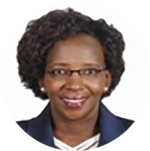 |
Dr. Linah Jebii Kilimo Chief Administrative Secretary, State Department for Gender, Ministry of Public Service and Gender Affairs, Government of Kenya Hon. Dr. Linah Jebii Kilimo was re-assigned the Chief Administrative Secretary, Ministry of Public Service and Gender on 17th February 2021 to support the Cabinet Secretary in the coordination of the State Department for Gender Affairs programmes. Prior to the re-assignment Hon. Dr. Kilimo served as the Chief Administrative Secretary in the Ministry of Agriculture Livestock & Fisheries since her appointment in January 2020. Hon. Dr. Kilimo also served as chair of the newly formed Anti-Female Genital Board in December 2013. She was the former Assistant Minister for Cooperative Development in Kenya Government (2008-2013); Minister of Immigration (2004-2005) and Minister of State, Office of the President (2003-2004). Finally, Hon. Dr. Kilimo was first elected in Kenya’s 2002 general elections as the Member of Parliament of Marakwet East Constituency. |
Organisers and modality of the event
UNDRR, Norad, Australian Aid, UNFPA, UN Women, the Women’s International Network for Disaster Risk Reduction as well as the Stockholm Environment Institute, the Huairou Commission, Government of Finland and Permanent Mission of Norway organize together a 90 minute virtual event to discuss how a gender-responsive approach to COVID-19 recovery can build resilience and reduce future disaster risk.
Co-organizers' materials
UN Women
Gender and age inequality of disaster risk
https://wrd.preventionweb.net/
Stockholm Environment Institute
Climate change, young women and girls: vulnerability, impacts and adaptation in Northern Thailand
A framework for transforming the relationship between development and disaster risk
Gender-responsiveness and disability inclusion in disaster risk reduction in Asia
Gender-responsiveness and disability-inclusion in disaster risk reduction in the Pacific